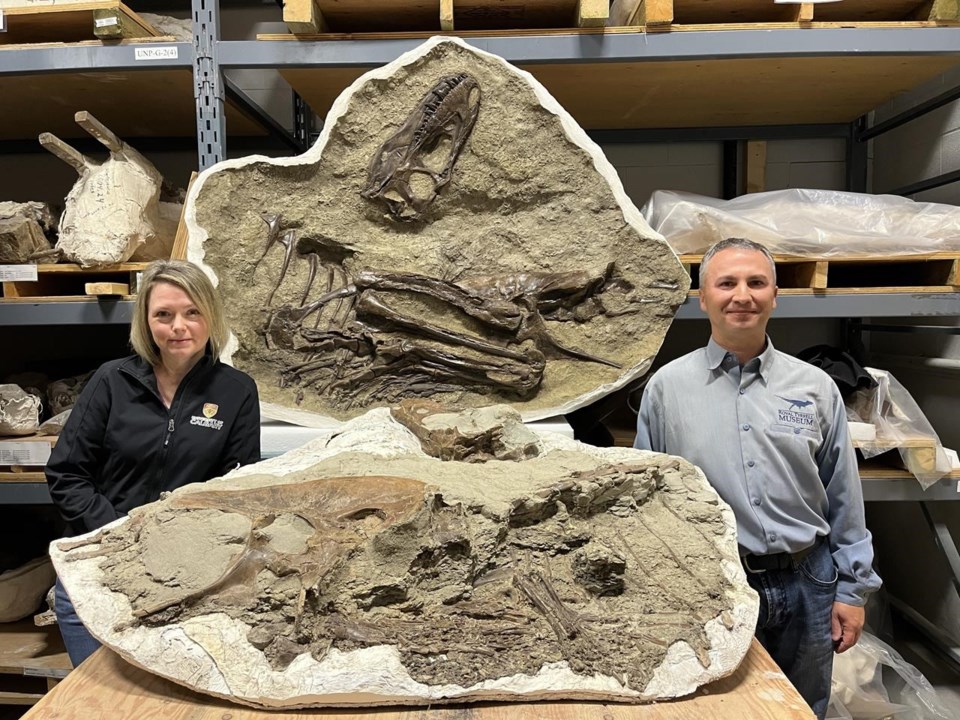CALGARY — A dinosaur fossil found in the Alberta badlands has revealed new details about the diet of young meat-eating tyrannosaurs.
The research, published Friday in the journal Science Advances, is based on a well-preserved Gorgosaurus libratus specimen discovered in 2009 by a technician from the Royal Tyrrell Museum in Drumheller, Alta.
"We describe the first tyrannosaur skeleton found with prey items preserved inside the stomach," Darla Zelenitsky, an associate professor in the department of earth, energy and environment at the University of Calgary, said in an interview.
"It's a juvenile, or teenage, gorgosaurus … that had eaten two young and small birdlike dinosaurs called Citipes."
Gorgosaurus was a tyrannosaur that lived 75 to 77 million years ago, before the Tyrannosaurus rex, in what is now southern Alberta. The specimen was found in Dinosaur Provincial Park, about 220 kilometres east of Calgary.
The four-metre long tyrannosaur had an estimated weight of 335 kilograms and, based on the research, would have been about five to seven years old when it died.
Zelenitsky said the fossil represents the first solid evidence of the diet of juvenile tyrannosaurs.
"It's really an exciting find, because it's unique and very unusual to find something like this, especially so well preserved."
Co-author François Therrien, curator of dinosaur palaeoecology at the Royal Tyrrell Museum, said it's an important discovery for several reasons.
"Skeletons of young tyrannosaurs are extremely rare," he said. "Their bones are smaller and more fragile, so either they didn't get fossilized back in (the) Cretaceous or they just get destroyed before we actually find them in the badlands."
He said a technician noticed some toe bones while the specimen was being cleaned.
"The toe bones were definitely too small to belong to the tyrannosaur and they were coming through the rib cage from inside the animal," Therrien said.
They decided to prepare the specimen from the inside out and discovered that the bones of the two small dinosaurs were preserved in the stomach area.
"That was truly amazing, because the last meal — or in-place stomach contents — of a tyrannosaur had never been discovered before, so that was really exciting," Therrien said.
The research, he added, took many years because there were so many pieces to put together. That included identifying the bones in the stomach, determining the age of those bones and the tyrannosaur, and figuring out how long the bones had been in the stomach.
Therrien said it shows a change in diet for tyrannosaurs as they matured.
"For a long time, we've known that adult and juvenile, or young, tyrannosaurs were very, very different physically."
Adult tyrannosaurs, he said, were large animals with massive skulls and robust teeth that fed on plant-eating duckbill and horned dinosaurs, while juveniles were lightly built and athletic with blade-like teeth and long legs.
"We suspected that they were hunting something else, but we did not know what. Now this specimen finally shows young tyrannosaurs hunted small and young dinosaurs."
Therrien said a transition from juvenile to adult, similar to people going through puberty, likely took place for the tyrannosaur around the age of 11.
Researchers determined that the young dinosaur was quite surgical in how it ate its prey.
"It went around and dissected away the back legs, swallowed those whole and basically didn't eat anything else of the carcass," said Therrien. "It took the hind legs and nothing else, probably because that was the meatiest part of the animals."
Zelenitsky added the young gorgosaurus appeared to be quite a fussy eater.
"Imagine that as a teenager," she said with a laugh. "This gorgosaurus had an appetite for Citipes drumsticks, I guess."
The research showed it had eaten the two birdlike dinosaurs in separate feeding events.
This report by The Canadian Press was first published Dec. 8, 2023.
Colette Derworiz, The Canadian Press




